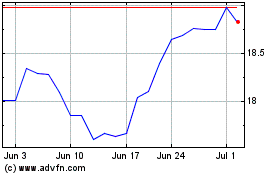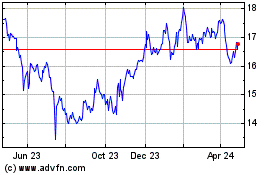T-Mobile-Sprint Trial: A Debate About Phone Bills
December 15 2019 - 11:29AM
Dow Jones News
By Sarah Krouse
Whether Americans will pay more for cellphone service is at the
center of arguments made by both sides battling last week over
T-Mobile US Inc.'s merger with Sprint Corp.
The coalition of state attorneys general that filed the
antitrust lawsuit challenging the $26 billion merger fear consumers
will pay more if the No. 3 and No. 4 U.S. carriers by subscribers
combine, and that wireless industry competition will suffer.
Plaintiffs' lawyers said in court that even though T-Mobile
promised not to raise the price of its rate plans for three years
after the deal, it could pull back on device-related
promotions.
T-Mobile executives, meanwhile, testified that they would lower
prices and better challenge larger rivals Verizon Communications
Inc. and AT&T Inc. if the deal is approved. They said T-Mobile
may have to raise prices if the transaction doesn't happen, a
situation that Chief Executive John Legere called a "worst
nightmare."
The deal, announced more than a year and a half ago, would
create a wireless company with more than 90 million U.S. customers.
It also would establish a new wireless carrier by selling assets to
satellite-TV provider Dish Network Corp.
Legal experts have called the states' challenge unprecedented
because they brought a case without the support or involvement of
federal authorities, who blessed the merger subject to certain
concessions.
U.S. District Judge Victor Marrero is weighing both sides'
arguments. He has pressed for a speedy trial, telling lawyers to
skip their customary opening arguments for expediency.
Plaintiffs concluded their case partway through the week,
turning it over to the defense to begin calling its roster of
witnesses.
During the first week of the trial, lawyers for the states tried
to show that T-Mobile has other ways to expand its network
capacity. Those options include buying spectrum in public auctions
or purchasing Dish--a move the firm contemplated in 2015--to gain
access to the company's trove of spectrum.
T-Mobile executives, meanwhile, have said that no other options
are comparable to what its merger with Sprint would yield in terms
of their complementary spectrum assets and potential cost savings.
The carrier's network is increasingly strained, they have said.
Judge Marrero asked Mr. Legere whether T-Mobile might become
"essentially one of the boys" along with Verizon and AT&T if
the deal occurs.
"That's a club they wouldn't let me join even if I wanted to,"
Mr. Legere replied.
The judge also asked the top executive why Sprint couldn't
achieve a turnaround now akin to what T-Mobile was able to achieve
after Mr. Legere joined in 2012 when it was in financial
trouble.
Mr. Legere said T-Mobile's advantages at the time included
better shareholder support than Sprint has now, as well as spectrum
and cash that the company he leads received from AT&T when it
abandoned efforts to buy T-Mobile in 2011. T-Mobile's condition
then was "nothing compared to the distress Sprint is in at this
time," he said, adding that Sprint will go away without the
deal.
A Sprint executive said earlier in response to a question from
the judge that the No. 4 U.S. carrier by subscribers wouldn't be
viable in its current form within the next two years.
Judge Marrero asked Mike Sievert, T-Mobile's chief operating
officer, how the carrier's plans to lower prices compared with past
promotions by Sprint that didn't work.
"They marketed an offer they couldn't afford to invest behind,"
Mr. Sievert replied, referring to Sprint. T-Mobile, he added, is
able to reduce prices and continue to invest in its network while
continuing to gain customers.
Write to Sarah Krouse at sarah.krouse@wsj.com
(END) Dow Jones Newswires
December 15, 2019 11:14 ET (16:14 GMT)
Copyright (c) 2019 Dow Jones & Company, Inc.
AT&T (NYSE:T)
Historical Stock Chart
From Mar 2024 to Apr 2024

AT&T (NYSE:T)
Historical Stock Chart
From Apr 2023 to Apr 2024
